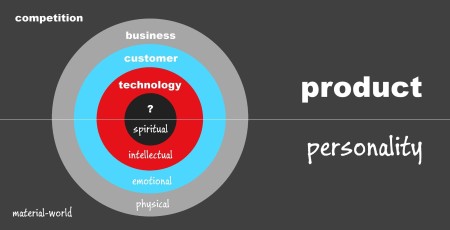While reading the second chapter of the Bhagwad Gita, as part of my comparative-study of the Human Ego from an Eastern and Western standpoint for my last 2 posts, it occurred to me that it’d (at least) be interesting to apply the same principles to Product Analysis. In my professional life, I’m often asked to analyze technology products – primarily software. Applying the same principles of the analysis of Human Personality as explained in the Gita, also gives an interesting framework for Product Personality Analysis.
The standard definition of “a thing produced by labor or effort”, is too broad a definition of Product, for the purpose of this post. The definition-scope for this post should be restricted to technology products like Facebook or technology platforms like Google or Windows. In a constrained sense, the same framework can be applied to feature level analysis or even a Company level analysis. In the following, I’ll very briefly (since it’s very simplistic) describe the framework. It’s also very easy to apply this framework to any of the products mentioned in the examples above:
Competition – The Material World – The External Environment
For any product, the competitive landscape decides the world in which it operates, just as the material world determines the external environment for the human personality.
Business – Body – The Physical Dimension
Just as the Senses and Material body form the Physical dimension of the human personality, a Product’s Business is like it’s Physical Dimension. It is the material existence (business model) of the product that determines it’s outward appearance, the sensory system and it’s action-organs, i.e. the infrastructure.
Customer/User – Mind – The Emotional Dimension
Even though the Customer is not physically a part of the Product, it dictates the Product the most – in most cases, more than any other dimension. The Customer is comparable to the human Mind (or Heart as it’s explained in the Western schools). It forms the emotional dimension of the Human Personality. A customer is essentially irrational, heart-driven, susceptible to desires and most often unpredictable.
Technology – Intellect – The Intellectual Dimension
A product’s technology directly maps to the Intellect of the Human Personality. It (like the Intellect) is the rational, analytic, scientific and predictable component of the product that can be measured and interpreted much easily than the Customer (Mind).

A pictorial representation of the Product Personality Framework (click to enlarge)
It is quite obvious how the Human Desires (Physical, Emotional & Intellectual) also map quite well to the Business, Customer and Technical Goals of a product. They also arguably, follow the same hierarchy as prescribed in the scriptures for humans: Intellectual desires > (is rated higher than) Emotional desires > Physical desires. Similar mappings exist for Actions and other similar concepts. However, I’ve missed out one important mapping, since I’m not entirely sure of it. What does the Soul or Spirit of a Product Map to? The closest mapping that I could think of, would be the Purpose or Mission of the Product. What is it’s value proposition to the world? What is it’s contribution to the life if it’s users? The only reason why I’m hesitant to map the spirit/soul to the Purpose, is because unlike the Soul which is abstract and infinite, the Purpose or vision of a product is relatively practical & measurable. It might be too broad based or hard to measure like Facebook’s mission – ‘to give people the power to share and make the world more open and connected’ or Google’s mission – ‘to organize the world’s information and make it universally accessible and useful.’, but definitely not infinite and un-measurable like the concept of the soul or spirit. However, in a lot of ways the missions map closely to the soul of these products.
In the end, the reader may or may not find this framework to be useful. To me, it gives an interesting parallel between human and product personality, and gives a great way to analyze a product in terms of it’s Physical, Emotional and Intellectual Quotients (PQ, EQ & IQ).
July 25, 2014 at 1:35 pm |
I really like and appreciate your blog post.Thanks Again. babeeeceeaee
August 20, 2014 at 12:36 pm |
This being a question of yours: I’ve missed out one important mapping, since I’m not entirely sure of it. What does the Soul or Spirit of a Product Map to? The closest mapping that I could think of, would be the Purpose or Mission of the Product. What is it’s value proposition to the world? What is it’s contribution to the life if it’s users?
You might want to consult Simon Sinek’s “What, How, Why” course of thinking. It provides cues towards soul/spirit
Cheers
Peter